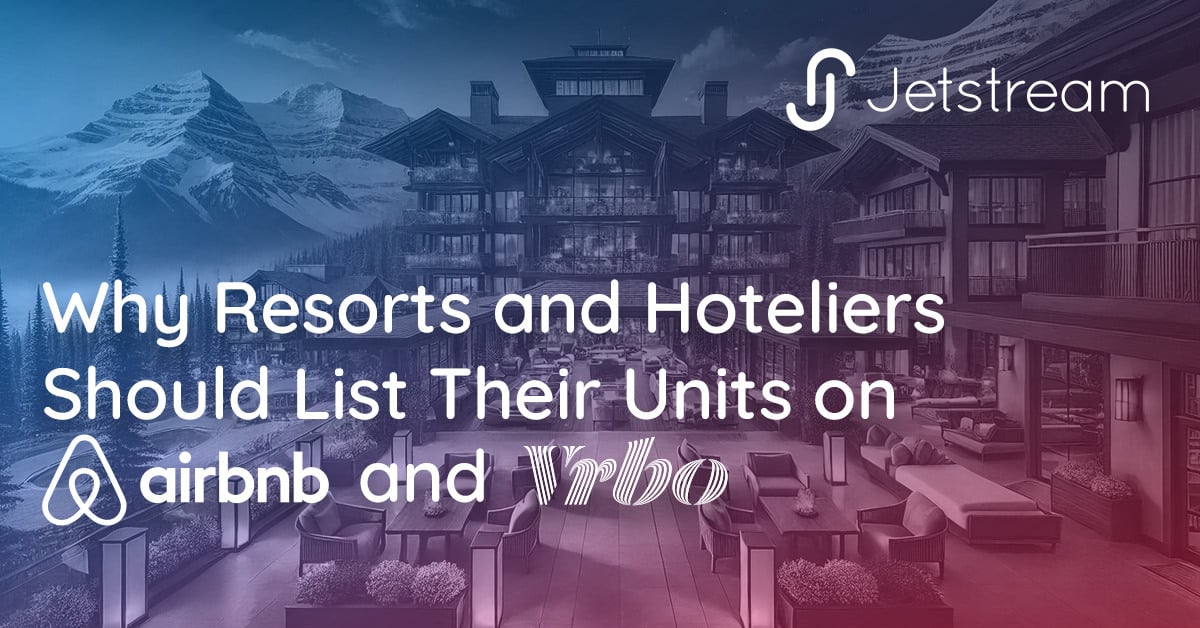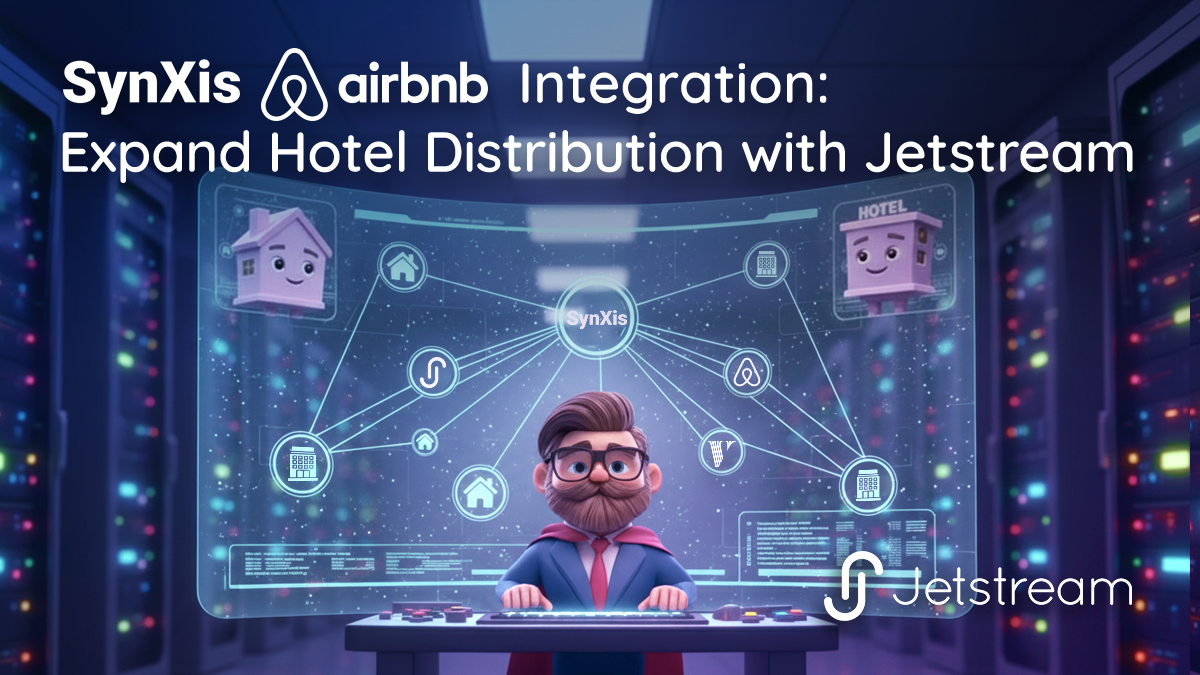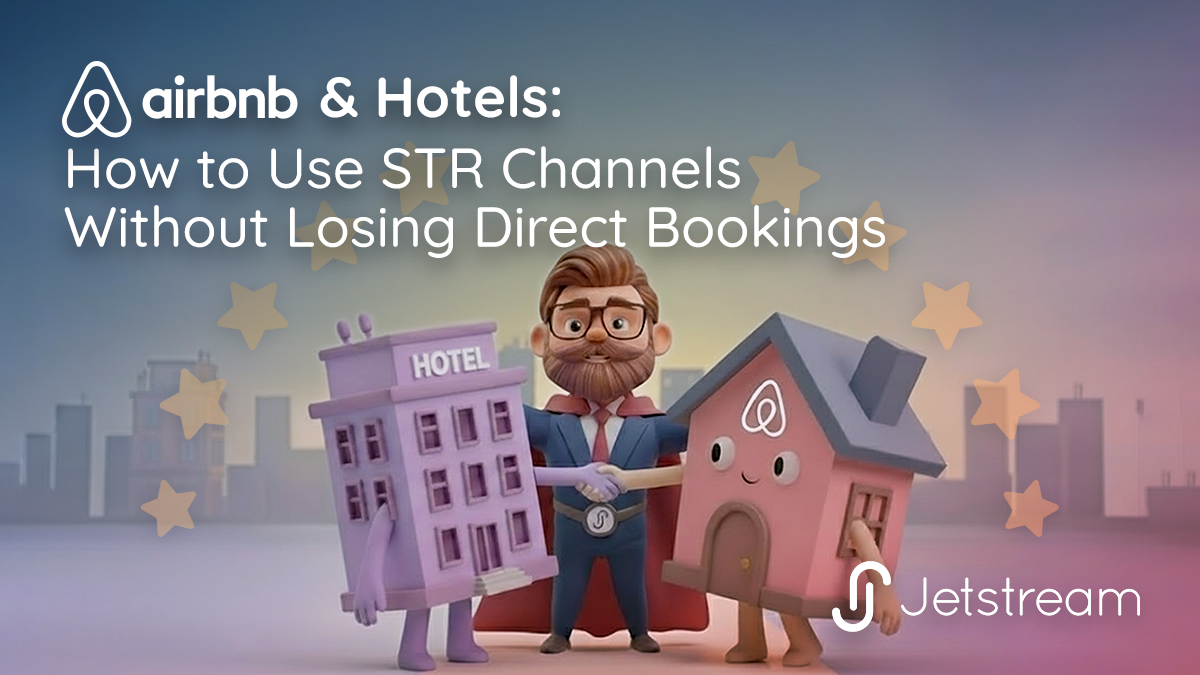5 min read
Why Resorts and Hoteliers Should List Their Units on Airbnb and VRBO
Jetstream
Jan 23, 2025 10:34:01 AM

The hospitality landscape has undergone a seismic shift over the past decade, with platforms like Airbnb and VRBO transforming how travelers book accommodations. For resorts and hotels, particularly in North America, these platforms present not just an alternative distribution channel but a strategic opportunity to drive revenue, attract new demographics, and adapt to changing travel trends. This article delves into why hoteliers should seriously consider listing their units on Airbnb and VRBO, addressing the various benefits and challenges with data-driven insights and real-world examples.
The Rise of Airbnb and VRBO: A Channel That Cannot Be Ignored
Unparalleled Growth Over the Past Decade
In the last ten years, Airbnb and VRBO have seen explosive growth. Airbnb, which started as a platform for sharing spare rooms, now dominates the short-term rental market. According to industry data, Airbnb accounted for approximately 20% of nights booked in the U.S. in 2023, up from 8% in 2016. VRBO, a direct competitor, has also captured significant market share, particularly in the vacation rental sector.
This growth has outpaced that of traditional OTAs (Online Travel Agencies) like Booking.com and Expedia. By listing on these platforms, hotels and resorts can access an audience that contributes to billions in annual bookings. The numbers are clear: failing to be present on these platforms means missing out on a significant share of the market.
Sources:Increased Length of Stay: Tapping Into Longer Vacations
One of the most compelling reasons to list on Airbnb and VRBO is their ability to attract travelers who book longer stays. Research from AirDNA shows that the average length of stay on Airbnb is 5-7 days, compared to 2-3 days on Booking.com or Expedia. This trend has grown stronger in the wake of the pandemic, with more travelers opting for "workcations" and extended vacations.
For hotels and resorts, this means higher average revenue per booking and reduced operational overhead associated with shorter stays. For example, a 10-room boutique hotel in Sedona, Arizona, saw its average stay increase by 40% after listing on Airbnb, thanks to families and remote workers booking week-long stays.
Jetstream clients saw average length of stay increase from 3.9 nights in 2023 to 4.5 nights in 2025. The Jetstream Synchronous Mapping (JSM) tool launched in 2023 processes 110 million calculations on a daily basis to process hotel rate plans into STR friendly promotion enabling Jetstream partners to seamlessly connect length of stay offers to drive longer stays.
Sources:
Competing With New Entrants: The Growing Supply on Airbnb and VRBO
The supply of Airbnb listings has surged over the past few years. Between 2020 and 2023, the number of active listings on Airbnb in the U.S. increased by 25%, reaching over 7 million globally. This expansion reflects growing consumer demand for alternative accommodations, including private homes, cottages, and unique stays.
Sources:
Capturing the Attention of Younger Travelers
Airbnb has cultivated a strong association with Millennials and Gen Z travelers, who now make up the largest share of global travelers. A 2023 survey found that 67% of Gen Z and Millennial travelers prefer Airbnb over traditional hotels due to its perceived authenticity, unique stays, and community-centric ethos.
For resorts aiming to attract these tech-savvy demographics, being present on Airbnb is a must. For instance, a beachfront resort in Florida reported a 25% increase in bookings from Millennials after listing its units on Airbnb, driven by the platform's ability to market to this audience effectively.
Sources:
The Billboard Effect: Driving Awareness and Direct Bookings
Listing on Airbnb and VRBO doesn’t just generate bookings through those platforms—it can also boost direct bookings. This phenomenon, known as the "billboard effect," occurs when travelers discover a property on an OTA but choose to book directly through the hotel’s website after conducting further research.
A study by Cornell University highlighted this effect, noting that properties listed on OTAs saw an average 20% increase in direct bookings. By leveraging Airbnb and VRBO as discovery platforms, resorts can capture additional revenue while maintaining a healthy mix of direct and third-party bookings.
Sources:
Reaching Wider Markets: A Truly Global Audience
Airbnb and VRBO cater to a global audience, with active users from over 190 countries. This provides North American resorts with an opportunity to attract international travelers who may not traditionally book through domestic OTAs or hotel websites.
For example, a luxury resort in Aspen, Colorado, reported a surge in bookings from European travelers after listing on Airbnb, many of whom were drawn to its unique alpine lodges and extended-stay packages. The platforms’ ability to translate listings into multiple languages and provide region-specific marketing is a key advantage.
Ready to Expand Your Reach Globally?
Reach millions of international travelers with Jetstream's expertise. Stand out on Airbnb and VRBO while maximizing bookings and revenue.
Expanding Without Cannibalizing Existing Channels
One common concern among hoteliers is the risk of cannibalizing direct bookings or other OTA channels. However, studies suggest that Airbnb and VRBO attract a different type of guest—one who may not have considered a traditional hotel stay. These platforms are particularly effective at reaching travelers seeking larger accommodations, unique experiences, or extended stays.
For instance, a resort in Napa Valley found that 60% of its Airbnb bookings came from first-time visitors to the area, many of whom were drawn to its family-friendly villas and private amenities.
Sources:
Regulation Constraints: An Undersupplied Market
In heavily regulated markets like New York City, short-term rental supply is limited due to stringent regulations. This creates a unique opportunity for hotels to capture demand from travelers who prefer Airbnb but struggle to find available listings. By positioning themselves on the platform, resorts can fill this gap and secure bookings that might otherwise go unfulfilled.
Jetstream provides extensive market and competitive data and some markets are definitely under supplied with some partners seeing almost guaranteed placement on page 1 of search results
Sources:
Responding to Declining Occupancy Trends
In recent years, North American hotels have faced declining occupancy rates. Data from STR indicates that average hotel occupancy in 2023 was 62.5%, down from pre-pandemic levels of 66.2%. Listing on Airbnb and VRBO can help bridge this gap by diversifying revenue streams and attracting non-traditional hotel guests.
Sources:
Promoting Larger Suites and Unique Accommodations
Airbnb and VRBO excel at marketing larger suites, cottages, and unique accommodations that often struggle to find visibility on traditional OTAs. Properties with distinctive features—such as multi-bedroom villas, private pools, or unique architectural designs—perform particularly well on these platforms.
For example, a resort in Hawaii saw a 35% increase in bookings for its three-bedroom villas after listing on Airbnb, with guests citing the detailed property descriptions and high-quality images as key factors in their decision-making process.
15% of Jetstream’s portfolio are pure hotel rooms or studios, 39% are one-bedrooms and the remaining share is between 2 and 12 bedrooms.
The unique “listing first” approach of Airbnb and VRBO helps larger units stand out in search results rather than being hidden behind the lead-in rate of the hotel or resort’s smallest room type.
In 2024 Jetstream upgraded its VRBO API to graphQL enabling even faster connectivity allowing partners with unique one-off properties to list without fear of double bookings.
Capturing the Mid-Term Stay Market
One of the fastest-growing segments on Airbnb and VRBO is the mid-term stay market, with bookings lasting 2-8 weeks or longer. These stays appeal to digital nomads, relocating families, and extended vacationers—segments that traditional OTAs often fail to cater to effectively.
A beachside partner in Cape Cod leverages this to offer multi-week and multi-month stays in low season to remote workers and temporary visitors.
Sources:
A More Opaque Sales Channel: Reducing Rate Shopping
Unlike Booking.com and Expedia, Airbnb and VRBO are less susceptible to rate-shopping behavior. Guests on these platforms tend to prioritize unique experiences, property features, and reviews over price comparisons, giving resorts more flexibility in pricing strategies.
By listing on these platforms, hoteliers can maintain rate integrity and reduce the pressure to offer constant discounts, as seen on traditional OTAs.
Conclusion: A Strategic Imperative for Hotels and Resorts
The case for listing on Airbnb and VRBO is clear. These platforms provide access to a vast, loyal, and diverse audience, help increase lengths of stay, and offer opportunities to tap into emerging travel trends like extended vacations and mid-term stays. By leveraging their unique capabilities, resorts and hotels in North America can drive incremental revenue, build brand awareness, and future-proof their operations in an increasingly competitive landscape.
Maximize Your Reach Today
Unlock the potential of Airbnb and VRBO with Jetstream’s seamless integration.
Our top picks |
|
|

READ: How Jetstream Powers Vail Resorts’ Airbnb and VRBO Strategy |

WATCH: CEO of Jetstream Shares Growth Tips for Airbnb & VRBO |



